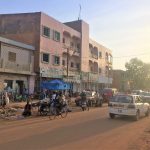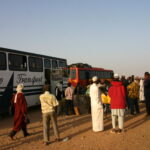Burkina Faso’s army was accused of arbitrarily killing 223 civilians, including 56 children, on February 25, an investigation revealed that highlighted one of the most serious incidents of military violence in the country in recent years. The tragic event was associated with expanded military efforts to combat jihadist terrorism, which occurred shortly after Russian troops arrived in the country to beef up security measures. According to a report by Human Rights Watch (HRW), these actions could be classified as crimes against humanity. The organization therefore urged the authorities in Burkina Faso to immediately establish a UN-supported investigation. By analyzing testimonies and reviewing video and photographic evidence, HRW researchers documented that the armed forces massacred 179 people, including 36 children, in the village of Soro, and another 44, including 20 children, in the nearby village of Nondin, located in the northern province of Yatenga. These findings emerged in conjunction with a summit in Nigeria attended by United Nations officials and African leaders to discuss counterterrorism strategies, which representatives from Burkina Faso did not attend. Experts noted that the atrocities occurred as the US counterterrorism strategy in the region was losing effectiveness, with Burkina Faso increasingly turning to Russia for its security strategy. The military president of Burkina Faso, Ibrahim Traoré, sees in this alliance with Moscow a potential turning point in the conflict that has seen the country oppose insurgent groups linked to the Islamic State and al-Qaida for almost ten years. Although the first Russian troops arrived a month before the killings, there are no indications of their involvement in the massacre. Eyewitnesses have confirmed without doubt that these atrocities are part of a prolonged anti-terrorism campaign that targets civilians accused of collaborating with Islamist militants. “Tirana Hassan, executive director of HRW, denounced that the Burkina Faso army has repeatedly perpetrated mass atrocities against civilians in the name of fighting terrorism, with almost no one held accountable,” he said. Residents of Soro said that on February 25, military forces, stopping first in Nondin and then in Soro, accused the local population of complicity with the jihadists. A 32-year-old survivor from Soro, wounded in the leg, told HRW: “They accused us of not cooperating with them [the army] because we did not report the movements of the jihadists.” In the village of Soro, residents described scenes of terror in which soldiers shot at huddled people who tried to hide or flee. “They divided men and women into separate groups,” a 48-year-old farmer told HRW. “I was in a field with others when they called us. As we approached, they opened fire indiscriminately. I saved myself by hiding behind a tree.” In Nondin, the soldiers proceeded house to house, ordering the inhabitants to come out and show their identity documents, then gathering them into groups and shooting. There were also shootings against individuals attempting to flee or hide.


